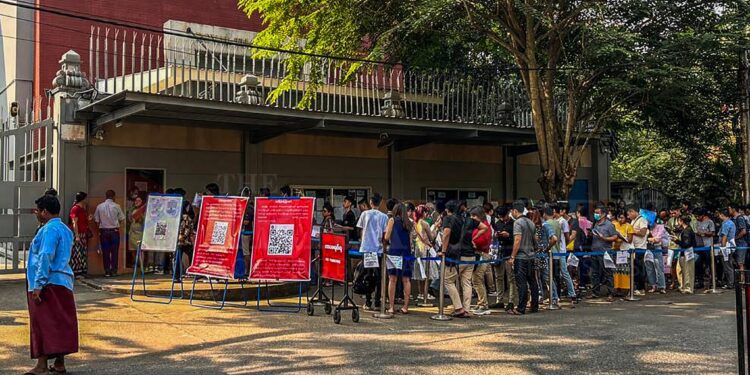The Myanmar military regime has eased restrictions on issuing permits for men to work abroad after suspending the process for nearly a week.
The regime suspended issuing permits for men to work abroad on May 1 amid its forced conscription of new military recruits.
Officials from the junta’s Labor Ministry phoned agencies that facilitate overseas employment on Monday and said it is accepting applications again, according to an official of the Myanmar Overseas Employment Agencies Federation (MOEAF).
“The Labor Ministry phoned and told agencies that it is accepting applications. Restrictions were eased on Monday,” he said.
However, the regime is still not accepting applications from men aged between 23 and 31, according to the agencies.
“Those policy changes were in place for a week. So, it has had no impact on us,” said an employee of an overseas employment agency based in Yangon.
The junta’s enforcement of the national conscription law on Feb. 10 has sent thousands queuing for visas outside foreign embassies in Yangon and others crossing into neighboring Thailand, as the law requires men aged 18 to 35 and women aged 18 to 27 to serve in the military for two to five years.
It began its first intake of forced recruits in March, prompting many citizens to head abroad. Widespread concerns arose after the regime suspended issuing permits for men to work abroad, as many conscription-age men view it as a way to avoid being drafted.
Meanwhile, it costs a fortune to work abroad. The costs include fees for language preparation, vocational training, and visa and passport applications. Many people borrow money to cover those costs.
A man from Thaton who is preparing to work in Japan said: “I had to borrow around 6 million kyats [about US$2,850] at an interest rate of 10 percent [per month] to undergo training in Yangon. It has been two months since then. As I can’t afford to pay the interest for long [it takes time to gain permission to work in Japan as language proficiency is necessary], I am considering illegally crossing the border into Thailand. I will have to borrow money for that. I heard it would cost 3 million kyats. I am afraid I won’t be able to repay all the debts in two years even if I could manage to work in Thailand.”
Young workers mostly go to Thailand, Malaysia and other neighboring countries for job opportunities, while a few head to Japan, Dubai and other countries further afield, according to overseas employment agencies.
The restrictions on working overseas will further fuel illegal border crossing into neighboring countries for jobs, said an overseas employment agency manager.
“They will try to leave by any means. More will consider crossing the border illegally. They will risk arrest and abuse as illegal workers,” he said.
The regime also temporarily suspended accepting permits to work overseas in February.

















